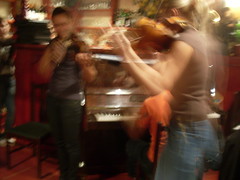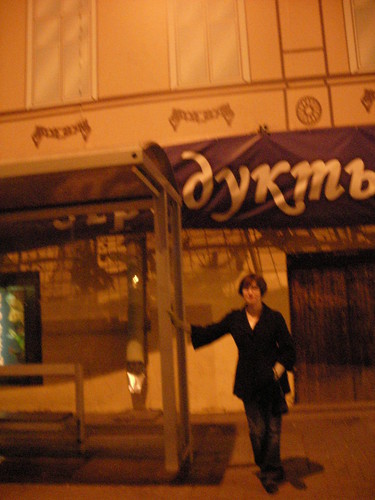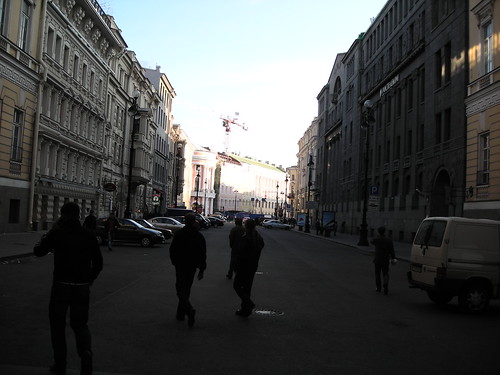Russia is Fun
From the last couple posts you might think I haven't been having a good time in Russia. That is not the case.
For instance, last night we went to a restaurant called Cafe Margarita, named after the protagonist from Bulgakov's amazing novel Master and Margarita. The cafe was across the street from Patriarch's Pond (where Master and Margarita opens) covered in art depicting scenes from the book, and a live band composed of two violins and a piano played riotous Russian dance music as the increasingly drunken audience called out numbers and cheered. Though I ordered myself a Sprite, people seemed to keep buying me vodka, and the next thing I know I'm at the piano playing Ziggy Stardust.
We made friends with some Texas tourists who were driving their way across Eastern Europe, and some Georgians took my phone number and promised to call me when they came to America.

Marina in front of Patriach's Pond. I take pictures better when drunk out of my mind.

Mugging in front of the statue of Mayakovsky on the way home from Margarita. This is a country that appreciates its writers. And builds statues of them. Lots and lots of statues. I like that.
Surviving Russia
Russia is not forgiving to visitors. In St. Petersburg, you're lucky if you can find a street sign. In Moscow there are more than four streets named Tverskaya-Yamskaya which all intersect. In general the simplest things are much harder and take much longer than they should.
All this cannot be better illustrated then by the trouble we've had simply finding the hostels with which we were booked. Fist there was 71 Griboedeva Hostel. One would think it would be located at 71 Griboedeva Street. However, at that location there is an unmarked door to a residential building. Fortunately we met with a friend who had a cell phone, and after calling the hostel we found out that we had to go around to the opposite side of the building, which is on a completely different street, and there we found the plaque telling us there was a hostel there, and instructions to dial up to the hostel's floor number and wait for someone to buzz us in. Why there is not the merest notice that you must do this at the address which is THE NAME OF THE HOSTEL is beyond me. And do they then give you a key or passcard to get into the building, like most other hostels I've stayed at? No, you must ring up any time you want to enter, which wasn't so great at three in the morning when it took the person at the desk about 20 minutes to answer.
Russian Beaurocracy Inaction, or How Not to Mail A Package in Russia
There are certain things you take for granted in America. The ability to mail a package at a post office is one of them.
Marina bought a shower bench for her eldarly grandfather, who we unfortantely can't visit this trip and lives WAY out in Siberia. She bought the bench in America, and figured it would be much easier and less expensive for her to send it from within Russia than from across the ocean. Little did we know.
Open Letter to David Foster Wallace's Literary Executor
To Whom it May Concern,
I don't yet know who might be inheriting the job of dealing the with David Foster Wallace Nachlass but whoever you are out there in the world, this is a request to you. Let me be frank and to the point: Let us see it all.
Not knowing how much remains unpublished of Wallace's work, not knowing what provisions he may have made or requests he may have left for whoever it falls to to see to the administration of his remaing material, I think it needs to be said that we want it, and that in my opinion there is no way that the publication of any juvenalia, unfinished manuscripts, rejected by the author incomplete essays, or abandoned novels will in any way harm the legacy of the greatest American writer of the last 50 years.
My reasons for believing this are as follows:
1.) Wallace's brilliance is fixed in literary history by his already published work. It would have been fixed by Infinite Jest alone, but that in concert with A Supposedly Fun Thing I'll Never Do Again, Girl with Curious Hair, Oblivion and Everything and More (which has been unjustly panned in this writer's estimation) has established an unassailable legacy of fine literary output. Anything additional, published correctly and with the understood caveat that it may not be up to the author's standards for his own work, will only add to our understanding of a literary giant the understanding of whom should be the work of anyone who cares about American letters. In short, the publication of everything can do no damage.
Plainsong Encomium for Another Dead Hero
I read Infinite Jest when I was eighteen. I picked it up on a lark at the Tower Records bookstore on Newbury Street in Boston. I needed something to read to take my mind off the music that had encompassed all of my waking brain time in my first semester at Berklee. It was thick and I figured it would keep me busy for a while at least. Little did I know.
Four months later, after dilligently working through that monster of a novel, I was quite possibly a different person. It was precisely the right book for me to read at precisely the right time in my life. I'm not sure it would be possible for me to state completely how much an influence his voice had on both my writing and my views on art in general. suffice it to say that I doubt there is anyone else I've ever read who had a greater impact.
This future that promises no more brilliance from that man's brain, when there should have been so much more, is not as good as the one we had a few days ago. His is a terrible loss to American literature.
Over the years, I've known a few brilliant people who decided to take their own lives. It never makes any sense. Having sat on that fence once or twice myself, I can't even fathom my own thoughts in that direction, and feel very grateful for the confidence I've found that I will never go there again. Suicide is one of the great tragedies of our form of life, a gesture at eternity that expresses a pain that defies words. I'm not a religious person, but I hope with all my being that whatever pain Wallace was feeling he has found some peace and relief from it now. I hope he knew at the end how much he and his work meant to people who, like me, had never even met him. We are all darkened a bit when our brightest lights go out. There is no question in my mind that David Foster Wallace was such a light.
Godspeed sir, my life has been better because of what you have given to us all. May you rest in peace.
Holy fucking shit David Foster Wallace Killed Himself!
Hanged himself. Jesus Christ.
More to follow as I process.
LA times confirms
http://www.latimes.com/news/local/la-me-wallace14-2008sep14,0,7461856.story
St. Petersburg is Hyperreal
In St. Petersburg, when they are doing construction on a building, the put a picture over it of what the building is supposed to look like This preserves the look of the city, which is homogenous and planned to an insane degree. In the last shot above of Morskaya Ulitza, spot the building with a picture over it in the back (it's the one in the light). The entire city is basically in the general style of the buildings in that shot, with nary a skyscraper or instance of modern architecture in site. It gives the place a labyrinthine quality, especially at night, and Marina and I spent several hours wondering around lost very late last evening.
Edit: It should be said that the city's architectural style is beautiful and also somewhat haunting. It's just weird to have a whole city built in the same basic vein, kind of like the architectural equivalent to the Japanese national style of drawing comics.
Advice Not Heeded
A woman who married a Russian told me once that if you're going to be with a Russian you have to learn their language, because Russians will think nothing of speaking only in Russian to each other, even if non-Russian speakers are with them. Even if all the Russian speakers speak English.
Advice I should have heeded apparently.
Off to Russia
Today I fly to Russia, for a long and much anticipated trip. I will return the evening of Monday the 22nd Edit: Tuesday the 23rd. And while I intend to do some travel blogging in this space (expect picturers!), updates may be spotty at best. So here's some stuff I've been meaning to post about for a while, nice long things to keep you occupied.
First is an absolutely fascinating series of posts from Hal Duncan, author of Vellum. In a series called "Notes on Strange Fiction" on his blog Notes from the Geek Show, Duncan does an in-depth lit theory analysis of narrative, language and weirdness in fiction. An excerpt from "Narrative's Function (2)", the most recent addition:
All narratives live in the Village, some as guardians or wards of the social contract, others as seditious prisoners intent on asserting their autonomy, challenging the legitimacy of authority. ("Who is Number One?" asks McGoohan's prisoner, the real question being less who is in charge as what.) Whatever the ethical impetus underlying a transgressive aesthetic stance, to the reactionary, these refusenik narratives are as often damned for rudeness as much as anything else, for breaches of the politeness principle -- with accusations of pretentiousness (the immodest and anti-generous assertion of prestige) and controversialism (deliberate disapprobation, tactlessness and disagreement for the sake of it). To the reactionary there is no real autonomy; all ethics are moral, all mores are part of the natural order, and all individuals are intrinsically subject to that order. So if the aesthetic stance of a narrative is transgressive this can only be willful perversity.
Here's the series:
Next on the docket, Sarah Weinman has just finished her "Publisher Imprint Report Card" series, in which she goes through each of the major publishers in America and talks about their imprints, dissecting where they're successful and where they fall flat. She names names and points fingers. It's an amazing read for anyone who is interested in what the publishing industry looks like right now and where it's going. An excerpt from part one:
Right now, common wisdom is that authors are brands and publishers are not - no matter how hard ex-HarperCollins CEO Jane Friedman banged that proverbial gong. Common wisdom is nowhere near so black and white, otherwise why would certain small press outfits like Soft Skull, Akashic, Hard Case Crime and Tachyon have clear publishing goals recognized by those who read their books (Soft Skull: offbeat, underground. Akashic: crime anthologies, literary punk. Hard Case Crime: retro-pulp fiction reissues and originals. Tachyon: smart SF/F that's not always easy to classify.) Conglomerates could, and should, learn from their less financially mighty cousins, as they should from the larger splintering of mass media, that their imprints should mean something to the reader. Sometimes that means staying with the status quo; other times it means doing away with the imprint altogether.
Here's the series:
Enjoy, and catch you on the flip side.
F Narrative Magazine Watch
Well, it appears the unscrupulous folks at Narrative Magazine are at it again, as questions emerge over whether their recent "First Person Story Contest" was rigged. A contest you have to pay to enter won by a close friend of the editors. Nothing suspicious about that...
See also other reasons to give Narrative the finger.
Thanks to Andrea for the tip!





